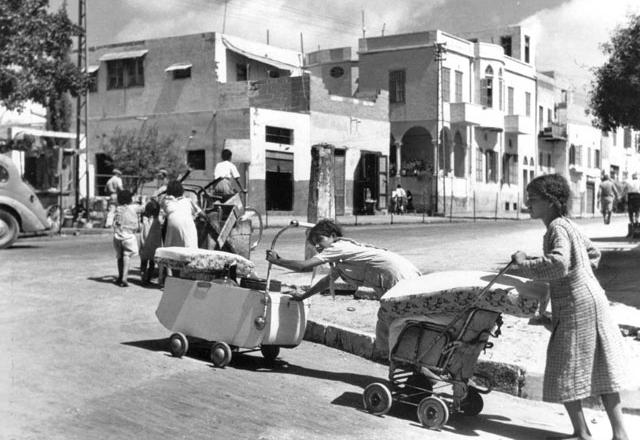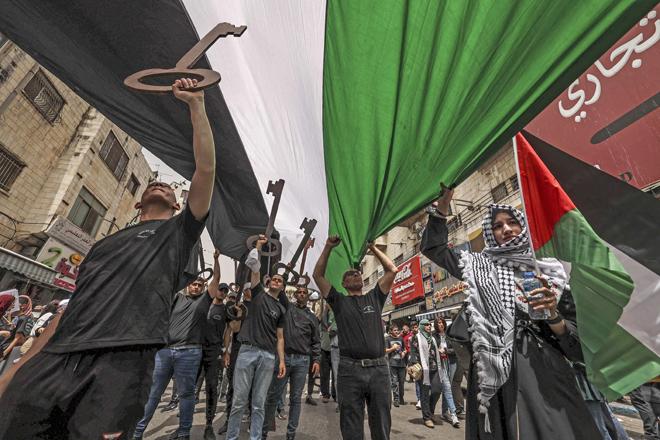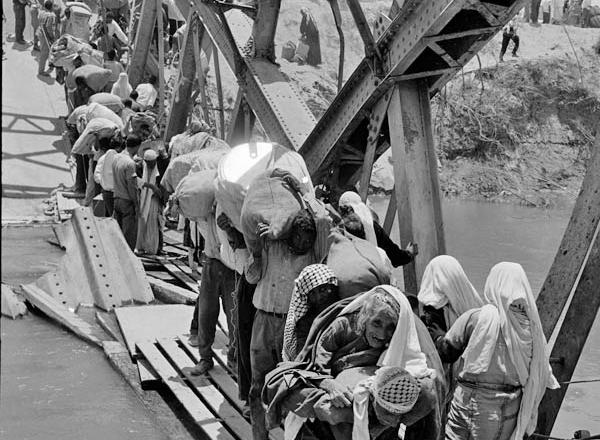You are here
Three generations after Nakbeh, ‘flame of hope’ remains in hearts of refugees
By Laila Azzeh - May 14,2015 - Last updated at May 14,2015

AMMAN — Almost three generations have been living in "anguish" since the Nakbeh — the day when the lives of more than 70,000 Palestinians took a "devastating turn".
On May 15, 1948, the state of Israel was created on the ruins of Palestine, forcing tens of thousands to flee their homes, a memory that has been haunting Husnieh Eid ever since.
Living in Jerusalem until 1948, she was 13 years old when she and her family fled massacres by Jewish gangs against the Palestinians.
Sixty-seven years later, Eid, who lived with her five brothers and parents on a farm in Al Lud, said she still remembers the day when her parents carried her at dawn and woke her brothers up and left their home.
"It was dark. My father said hurry up. The Jewish gangs are killing us [Palestinians]. We left everything behind us. I only took my cotton doll," Eid said Thursday, recalling how she fled with her family from one Palestinian town to another until they crossed into Jordan.
"It was very scary. I am about to turn 80 and I cannot forget the day they stole our homeland," she said.
Salameh Hassuneh, a 79-year-old from Jaffa, who fled with his family to the West Bank in 1948 and later to Jordan, said he was a young man when he and his family left.
"My father used to sell fruits in Jaffa. It is a very beautiful city where I still remember how I spent my childhood," Hassuneh said.
"We migrated to Jordan and until the day my father died he was eager to return to his shop and home. But this was not the case," he said.
"Many of the old generation who lived the Nakbeh died. But all of us should remind our grandchildren of what happened because this is our identity and our issue," he said.
“I keep telling my story to my grandchildren because I do not want them to forget… The whole world does not care about our cause and what happened to us. But hopefully justice will prevail and our children and their children can return to their homeland,” he said over the phone Thursday.
Today, UNRWA (the UN agency responsible for providing Palestinian refugee with their basic needs) is responsible for five million refugees in its five fields of operations — Jordan, Lebanon, Syria, Gaza and the West Bank.
Describing the situation as tragic, the agency says that until today, Palestinian refugees remains a “scattered people, further displaced by conflict, blockade and living under occupation, marginalised by national legislation, deprived of rights and fervently longing for a resolution of their exile and dispossession”.
The Nakbeh’s 67th anniversary arrives this year while Arabs are living the worst nightmares of internal conflicts, wars and terrorism, according to activists, who said that the situation of the region now “serves no one but the Zionist entity”.
Adnan Abu Odeh, former Royal Court chief and veteran politician and analyst, noted that since the Oslo Accords, 22 years have passed and the Palestinian state is “still far away from materialising”.
Citing the situation in Yarmouk Palestinian refugee camp in Syria, he noted that “one has to remember the complexity of the Arab-Israeli conflict and how the Palestinian question has compounded”.
“We have to remember the suffering of Palestinians everywhere. The Yarmouk [camp] has been badly hit by warriors from different sides, leading refugees to evacuate to a second place,” he added.
“Instead of standing up to take back their rights, Arabs and Muslims are busy with their internal disputes. This fragmentation serves Zionism pretty well,” head of the Lower House Palestine Committee, MP Yahya Saud, told The Jordan Times.
In a report issued by the Palestinian Central Bureau of Statistics on Tuesday, the number of Palestinians has doubled nine times since the Nakbeh, reaching around 12.1 million by the end of 2014.
The number of Palestinians who live inside “historical Palestine” stood at 6.1 million last year.
Palestinians who never left their homeland in 1948 stood at 145,000 following the war, and increased to 1.5 million today, according to the agency.
‘Dream still alive’
Despite the current state of “unknown fate and acute confusion” in the Arab world — as described by unionist Bassam Kiswani — the Palestinian cause is still alive even if the first generation who witnessed the displacement of 1948 has died.
“There will always be a glimpse of hope to seize Palestine back,” the activist said.
Stressing that even though the Israeli state derives its power today by not abiding by humanitarian and international laws, Kiswani noted that Arabs will “wake up one day and restore their rights”.
Saud echoed the same sentiments, saying that the Palestinian cause is the “compass” in the heart of each “decent” Arab and its centrality is preserved, thanks to His Majesty King Abdullah’s efforts in all national and international arenas.
“I hope that one day we will be able to return home. Arabs and Muslims should help us and do something other than empty talk,” Eid said.
Mohammad Ghazal contributed to this report
Related Articles
AMMAN — Monday marks the 75th anniversary of the Nakbeh, (catastrophe), commemorating the ethnic cleansing and forced displacement of 750,00
OCCUPIED JERUSALEM — Palestinians rallied Sunday to mark the "Nakbeh," or catastrophe, 74 years after Israel's creation, with condemnation s
A 1975 photo shows Palestinian refugee Fathiyeh Sattari, her eyes wide with worry, as she presents her malnourished baby boy to a doctor at a clinic run by a UN aid agency.














